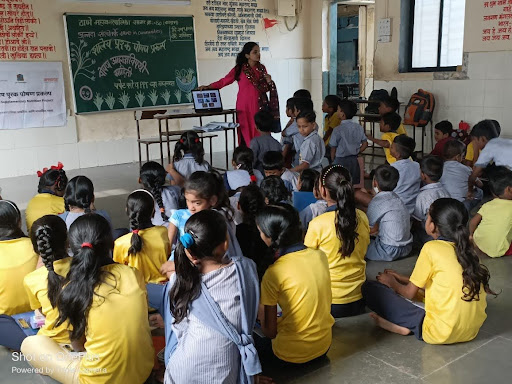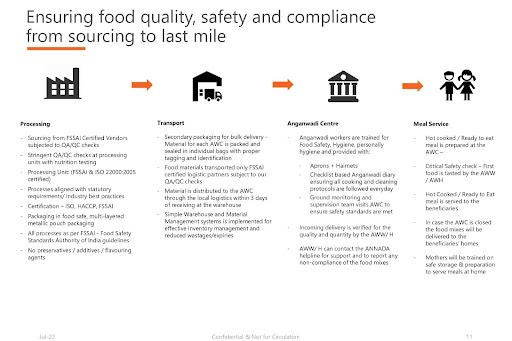How are we ensuring food safety across projects?
In our fight against early childhood malnutrition, ensuring food safety is a fundamental necessity. At ANNADA, we understand that delivering nutritional adequacy at scale requires a steadfast commitment to food safety assurance.
Here is a quick look at the measures we take to ensure food safety & quality in our health & nutrition programs that cater to thousands of children across multiple rural and remote locations spread out across large distances and rugged terrain. emphasizes the need for robust safety protocols and standards throughout the supply chain.

Sourcing of right ingredients
Quality assurance begins with sourcing ingredients from vendors certified by the Food Safety and Standards Authority of India (FSSAI). These vendors undergo rigorous QA/QC checks to ensure the safety and purity of processed food materials.
Processing at Certified Units
Processing takes place at certified units adhering to ISO 22000:2018 and FSSAI standards. Strict QA/QC checks are conducted alongside nutrition testing, following statutory requirements and industry best practices. The manufacturing facility follows GMP and HACCP protocols.
Zero preservatives – Excluding preservatives, additives, and flavoring agents helps to prevent any unnecessary exposure to any chemical agents which may be harmful to the child. Food mixes for ANNADA are blended and processed in a way that increases their shelf life without the need for preservatives.
Packaging methodology
Materials are packaged in food-safe, multi-layered metallic pouches to maintain food safety during transportation. This is in alignment with FSSAI guidelines.
Efficient Warehouse and Material Management
Efficient inventory management reduces wastage and prevents items from expiring. A simple warehouse and material management system ensures prompt distribution to Anganwadi Centers (AWCs).
First in First out – FIFO
Although the food mix packets have a shelf life of over 5 months, beneficiaries are provided enough nutritious food material enough only for 1 month’s consumption. The beneficiaries are also provided with an airtight container to store the food mix packets once opened. Each of the 3 packets are to be consumed within 10 days (about 1 and a half weeks).
Field supervision teams conduct home visits to educate them on good nutrition and health practices and to monitor the adequate consumption of food mixes by the beneficiary. This also helps to prevent any leftover food mixes beyond the date of expiry.
Ensuring Quality during Transit
For transport to the beneficiary community, the food mix packets are secondarily packed for bulk deliveries, packed and sealed individually for identification. Logistics partners chosen are also FSSAI certified and undergo QA/QC checks.
Empowering Anganwadi Workers
AWC workers receive extensive training in food safety, hygiene, and personal hygiene practices. They verify incoming deliveries and report any non-compliance to the designated helpline.
Meal Service Safety
After a critical safety check, hot-cooked or ready-to-eat meals are served at AWCs or beneficiaries’ homes. Mothers or caregivers taste the food first and are trained in safe storage and meal preparation practices.
This approach ensures that beneficiaries receive safe, nutritious meals, promoting their well-being and health. Through stringent standards, continuous training, and efficient management practices, ANNADA’s model prioritizes quality, compliance, and food safety and nutrition accountability.










